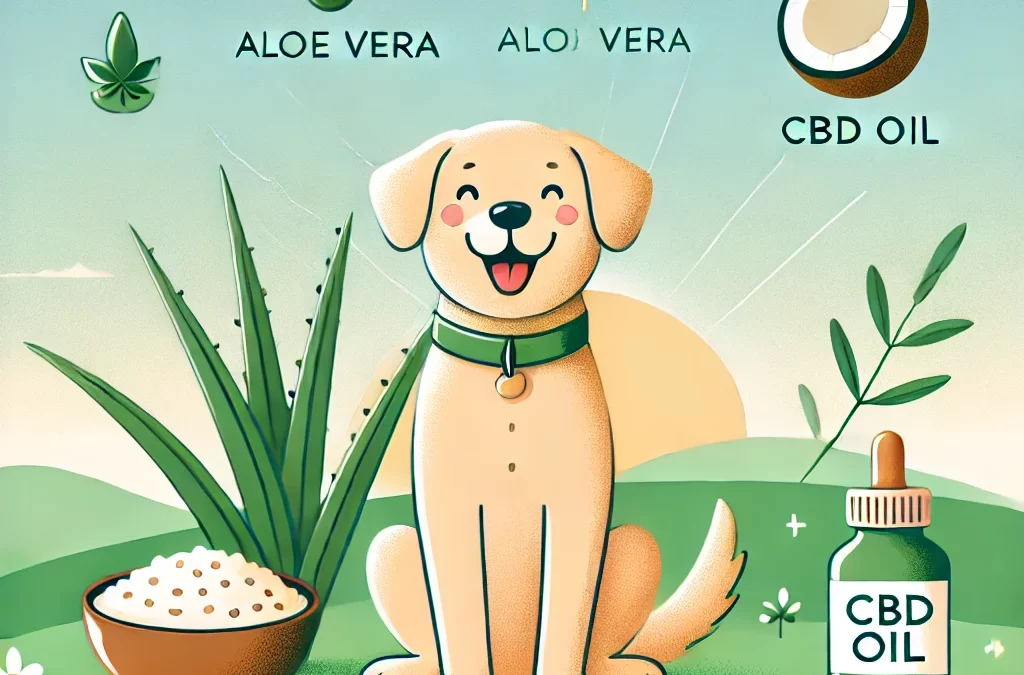
von TCMVET | 28. Oktober 2024 | Ernährungsgesundheit
Protein ist einer der wichtigsten Nährstoffe in der Ernährung Ihres Hundes. Jede Zelle im Körper Ihres Hundes enthält Protein, das für den Aufbau und Erhalt von Haut, Haaren, Muskeln, Organen und verschiedenen Geweben entscheidend ist. Eine Ernährung, die reich an hochwertigem Protein ist, hilft Hunden, stark zu werden und ihr Leben lang gesund zu bleiben.
Warum Protein für Hunde wichtig ist
- Aufbau und Reparatur von Zellen – Protein ist ein grundlegendes Element für Zellwachstum und -reparatur. Egal, ob ein Hund jung ist, wächst oder sich von einer Verletzung erholt, Protein hilft, beschädigte Zellen zu reparieren und neue zu bilden, wodurch der Körper widerstandsfähig bleibt.
- Unterstützung der Muskelkraft – Protein ist für den Muskelaufbau und -erhalt unerlässlich. Starke Muskeln sind entscheidend für die allgemeine Beweglichkeit, Ausdauer und sogar die Gesundheit der Gelenke, da sie den Körper Ihres Hundes bei täglichen Aktivitäten unterstützen.
- Wichtig für Wachstum und Schwangerschaft – Für Welpen und trächtige Hündinnen ist die Proteinzufuhr besonders wichtig. Sie unterstützt schnelles Wachstum und Entwicklung und stellt sicher, dass Welpen die Nährstoffe haben, die sie für starke Knochen, Muskeln und Organe brauchen, während sie heranwachsen.
Auswahl hochwertiger Proteinquellen
Bei der Auswahl von Hundefutter ist es wichtig, das Etikett zu lesen, um sicherzustellen, dass Protein eine der ersten aufgeführten Zutaten ist. Zutaten wie Huhn, Rind, Lamm und Fisch sind hervorragende Quellen für hochwertiges Protein, das die notwendigen Aminosäuren für die Gesundheit Ihres Hundes liefert. Futter mit „Fleischmehl“ oder „Nebenprodukten“ kann von geringerer Qualität sein; entscheiden Sie sich daher für Marken, die echtes Fleisch als Hauptzutat auflisten.
Wie viel Protein braucht Ihr Hund?
Der ideale Proteinbedarf variiert je nach Alter, Größe und Aktivitätsniveau. Sehr aktive Hunde oder solche, die Agility-Training absolvieren, benötigen beispielsweise möglicherweise eine höhere Proteinzufuhr, um die Muskelreparatur und den Energiebedarf zu unterstützen. Welpen profitieren aufgrund ihres Wachstumsbedarfs und ältere Hunde, die Unterstützung beim Erhalt ihrer Muskelmasse benötigen, ebenfalls von einem ausgewogenen Proteingehalt. Ein Gespräch mit Ihrem Tierarzt kann Ihnen dabei helfen, die richtige Proteinmenge für den spezifischen Bedarf Ihres Hundes zu bestimmen.
Vorteile einer proteinreichen Ernährung für Hunde
Eine Ernährung, die reich an hochwertigem Eiweiß ist, bietet Hunden zahlreiche gesundheitliche Vorteile, darunter:
- Starke, schlanke Muskeln – Protein hilft beim Erhalt der Muskelmasse und unterstützt die allgemeine Kraft und Beweglichkeit.
- Gesunde Haut und Fell – Protein fördert eine gesunde Haut und ein glänzendes Fell und hält das Fell Ihres Hundes glatt und kräftig.
- Bessere Immunfunktion – Ausreichend Protein unterstützt das Immunsystem eines Hundes und hilft, Infektionen und Krankheiten wirksamer abzuwehren.
- Optimale Energieniveaus – Protein liefert die Energie, die aktive Hunde brauchen, damit sie verspielt und voller Energie bleiben.
Eine proteinreiche Ernährung Ihres Hundes ist für seine Gesundheit und sein Wohlbefinden von grundlegender Bedeutung. Vom Muskelaufbau über ein glänzendes Fell bis hin zur Steigerung der Energie spielt Protein im Leben Ihres Hundes eine entscheidende Rolle. Achten Sie auf den Futteretiketten auf hochwertige Proteinquellen und berücksichtigen Sie die individuellen Bedürfnisse Ihres Hundes, damit er gut gedeiht.

von TCMVET | 28. Oktober 2024 | Ernährungsgesundheit
Ein glänzendes, gepflegtes Fell ist oft der erste Indikator für den allgemeinen Gesundheitszustand eines Hundes. Für Tierbesitzer ist es nicht nur ästhetisch ansprechend, sondern auch ein Zeichen dafür, dass die Ernährung ihres Hundes die wesentlichen Nährstoffe liefert, die für eine optimale Haut- und Fellgesundheit erforderlich sind. Zu den wichtigsten Nährstoffen gehören Omega-3- und Omega-6-Fettsäuren, die dazu beitragen, ein starkes, glänzendes Fell und eine gesunde Haut zu erhalten.
Omega-Fettsäuren und ihre Rolle für die Gesundheit von Hunden
- Omega-6-Fettsäuren – Omega-6-Fettsäuren sind für Hunde unerlässlich, da sie die Zellfunktion, die Hydratation und die Widerstandsfähigkeit gegen äußere Einflüsse unterstützen. Sie spielen eine wichtige Rolle bei der Feuchtigkeitsversorgung der Haut, was zu weniger Trockenheit und Schuppenbildung führt. Ohne ausreichend Omega-6-Fettsäuren kann die Haut eines Hundes trocken und anfällig für Reizungen werden, was zu stumpfem, brüchigem Haar führt, das leicht bricht.
- Omega-3-Fettsäuren – Omega-3-Fettsäuren haben entzündungshemmende Eigenschaften, die besonders für Hunde mit empfindlicher Haut oder zu Allergien neigende Hunde von Vorteil sind. Diese Fettsäuren lindern Juckreiz, Rötungen und Reizungen, indem sie Entzündungen in der Haut lindern. Omega-3-Fettsäuren sind besonders in den Wintermonaten nützlich, wenn niedrige Luftfeuchtigkeit zu trockener Haut und Unwohlsein führen kann.
Vorteile ausgewogener Omega-Fettsäuren für Hunde
In ausgewogenen Anteilen tragen Omega-3- und Omega-6-Fettsäuren zu Folgendem bei:
- Ein glänzender Mantel – Omega-Fettsäuren versorgen die Haut mit Nährstoffen, reduzieren Trockenheit und sorgen dafür, dass das Haar mit gesundem Glanz wächst. Das Ergebnis ist ein glattes, glänzendes Fell, das weniger zu übermäßigem Haarausfall neigt.
- Reduzierte Entzündung und Juckreiz – Hunde mit Allergien oder empfindlicher Haut profitieren von der entzündungshemmenden Wirkung von Omega-3-Fettsäuren, die helfen, häufige Symptome wie Juckreiz, Rötungen und Reizungen zu lindern.
- Kräftigeres Haar und weniger Haarausfall – Gesunde, mit Feuchtigkeit versorgte Haut fördert kräftiges Haarwachstum und macht das Fell weniger anfällig für Haarbruch und Haarausfall. Eine ausgewogene Aufnahme von Fettsäuren sorgt dafür, dass das Haar verankert und lebendig bleibt.
Natürliche Quellen für Omega-Fettsäuren für Hunde
Viele hochwertige Hundefutter enthalten Omega-Fettsäuren aus Zutaten wie Fischöl, Leinsamen und Hühnerfett. Diese Zutaten unterstützen die Gesundheit von Haut und Fell auf natürliche Weise ohne künstliche Zusatzstoffe. Darüber hinaus können Nahrungsergänzungsmittel wie Fischöl oder Lachsöl zur Ernährung Ihres Hundes hinzugefügt werden, um die Aufnahme von Omega-3-Fettsäuren zu steigern, insbesondere bei Hunden mit bestimmten Hauterkrankungen.
So wählen Sie Lebensmittel mit hohem Omega-Gehalt aus
Achten Sie bei der Auswahl von Hundefutter oder Nahrungsergänzungsmitteln darauf, dass auf dem Etikett Omega-3- und Omega-6-Fettsäuren aufgeführt sind. Wählen Sie unbedingt Marken, die natürliche Quellen verwenden, da diese besser aufgenommen werden und die allgemeine Gesundheit von Haut und Fell wirksamer fördern. Auch die Beratung durch Ihren Tierarzt kann helfen, das richtige Gleichgewicht der Fettsäuren sicherzustellen, insbesondere wenn Ihr Hund spezielle Hautprobleme hat.
Die Fellgesundheit eines Hundes ist mehr als nur oberflächlich. Indem Sie der Ernährung Ihres Hundes ein ausgewogenes Verhältnis von Omega-3- und Omega-6-Fettsäuren hinzufügen, können Sie eine gesunde Haut fördern, Entzündungen reduzieren und für ein glänzendes, schönes Fell sorgen. Durch die Bereitstellung dieser Nährstoffgrundlage kann Ihr Hund das ganze Jahr über gut aussehen und sich wohlfühlen.

von TCMVET | 28. Oktober 2024 | Ernährungsgesundheit
Eine ausgewogene Ernährung Ihres Hundes ist für seine Gesundheit, Energie und sein Wohlbefinden von grundlegender Bedeutung. Hunde sind wie Menschen auf eine Reihe wichtiger Nährstoffe angewiesen, wie Proteine, Kohlenhydrate, Fette, Vitamine, Mineralien und Wasser. Jeder dieser Nährstoffe spielt eine bestimmte Rolle, von der Energieversorgung bis zur Krankheitsvorbeugung. Wenn Tierbesitzer diese Nährstoffbedürfnisse kennen, können sie fundierte Entscheidungen für das Wohlbefinden ihrer Haustiere treffen.
Der Nährstoffbedarf variiert je nach Alter und Gesundheitszustand
So wie Menschen im Laufe ihres Lebens unterschiedliche Ernährungsbedürfnisse haben, gilt das auch für Hunde. Welpen beispielsweise benötigen mehr Protein, um zu wachsen, während erwachsene Hunde ein stabiles Gleichgewicht aller Nährstoffe benötigen, um gesund und voller Energie zu bleiben. Es gibt auch speziell zusammengestellte Diäten für ältere Hunde, die auf eine leichtere Verdauung und die Unterstützung der Gelenke abzielen. Darüber hinaus sind einige Hundefutter auf bestimmte gesundheitliche Probleme wie empfindliche Haut, Verdauungsprobleme oder Allergien abgestimmt.
Kernnährstoffe und ihre Vorteile für Hunde
- Proteine – Proteine sind für Muskelwachstum, Gewebereparatur und die Unterstützung des Immunsystems unerlässlich. Aktive Hunde profitieren stark von Proteinen, da sie den Muskelerhalt und die Energieversorgung unterstützen.
- Fette – Fette sind eine konzentrierte Energiequelle, die die Gesundheit des Gehirns, die Haut und ein glänzendes Fell unterstützt. Essentielle Fettsäuren wie Omega-3 und Omega-6 sind dafür bekannt, Entzündungen zu reduzieren, die Gesundheit der Gelenke zu unterstützen und das Immunsystem zu stärken.
- Kohlenhydrate – Kohlenhydrate liefern Energie für die täglichen Aktivitäten, insbesondere für energiegeladene Hunde. Ballaststoffe aus Kohlenhydraten fördern auch die Verdauungsgesundheit und beugen häufigen Problemen wie Verstopfung oder Blähungen vor.
- Vitamine und Mineralien – Essentielle Vitamine und Mineralien wie Kalzium und Vitamin E unterstützen die Knochenstärke, den Zellschutz sowie die Muskel- und Nervenfunktion. Diese Nährstoffe sind in kleinen Mengen notwendig, aber dennoch für das allgemeine Wohlbefinden Ihres Hundes von entscheidender Bedeutung.
- Wasser – Wasser ist oft der am meisten übersehene Nährstoff, aber für die Aufrechterhaltung der Körperfunktionen von entscheidender Bedeutung. Ein gut hydrierter Hund hat eine bessere Verdauung, Durchblutung und Temperaturregulierung.
Wählen Sie ein Hundefutter, das den Bedürfnissen Ihres Haustiers entspricht
Bei der Auswahl des richtigen Futters müssen Alter, Größe, Aktivitätsniveau und Gesundheitszustand Ihres Hundes berücksichtigt werden. Das Lesen der Zutatenliste und die Auswahl von Produkten mit hochwertigen Zutaten wie echtem Fleisch und natürlichen Vitaminquellen trägt zu einer optimalen Ernährung bei. Wenn Ihr Hund besondere Bedürfnisse hat, wenden Sie sich an einen Tierarzt, um eine Ernährung zu finden, die seine individuellen Gesundheitsziele unterstützt.
Tipps für eine ausgewogene Ernährung
Zu einer ausgewogenen Ernährung gehört auch, Überfütterung oder übermäßige Leckerlis zu vermeiden, da diese zu Gewichtszunahme und Nährstoffungleichgewichten führen können. Regelmäßige Tierarztuntersuchungen sind wichtig, um die Ernährung an die sich ändernden Bedürfnisse Ihres Hundes anzupassen, insbesondere wenn er älter wird.
Eine ausgewogene, nährstoffreiche Ernährung ist der Grundstein für die Gesundheit und Langlebigkeit von Hunden. Von der lebenswichtigen Energie, die Proteine und Fette liefern, bis hin zur krankheitsbekämpfenden Wirkung von Vitaminen und Mineralien trägt jeder Nährstoff zum Wohlbefinden Ihres Hundes bei. Indem Sie eine Ernährung wählen, die auf die spezifischen Bedürfnisse Ihres Haustiers abgestimmt ist, können Sie ihm zu einem aktiven und gesunden Leben verhelfen.

von TCMVET | 25. Oktober 2024 | Ernährungsgesundheit
Wenn ein Hund an einem Tumor leidet, steigt sein Energiebedarf erheblich an, sodass Ernährungsumstellungen für seine Gesundheit unerlässlich sind. Eine sorgfältig geplante Ernährung kann die Immunfunktion Ihres Hundes unterstützen, die Muskelmasse erhalten und den Energiehaushalt im Gleichgewicht halten. Hier sind einige Ernährungsrichtlinien, die Hunden mit Tumoren helfen können.
1. Hohe Nährstoffdichte
Hunde mit Tumoren haben aufgrund der Bemühungen des Körpers, die Krebszellen zu bekämpfen, oft einen höheren Energieverbrauch als üblich. Dies erfordert eine Ernährung, die reich an nährstoffreichen, leicht verdaulichen Nahrungsmitteln ist. Eine hohe Nährstoffdichte stellt sicher, dass Ihr Hund wichtige Vitamine, Mineralien und Energie erhält, ohne seinen Körper mit leeren Kalorien zu überlasten. Nährstoffreiche Nahrungsmittel sind wichtig, da sie die benötigte Energie und Nährstoffe in kleineren, überschaubareren Portionen liefern.
Empfohlene Lebensmittel: Mageres Fleisch, Eier, Innereien (wie Leber) und grünes Gemüse.
2. Vermeiden Sie viele Kohlenhydrate
Da Tumorzellen hauptsächlich Glukose zur Energiegewinnung nutzen, ist es wichtig, die Kohlenhydrataufnahme zu reduzieren. Kohlenhydrate werden im Körper in Glukose umgewandelt, die das Tumorwachstum fördert. Durch die Einschränkung der Kohlenhydrate können Sie möglicherweise das Tumorzellwachstum verlangsamen und die Energieversorgung verringern, von der Krebszellen abhängig sind.
Empfohlene Ersatzprodukte: Entscheiden Sie sich statt für kohlenhydratreiche Lebensmittel wie Getreide und stärkehaltiges Gemüse für Blattgemüse, mageres Eiweiß und gesunde Fette.
3. Erhöhen Sie hochwertige Fette und Proteine
Fette und Proteine sind wichtige Bestandteile einer krebsfreundlichen Ernährung für Hunde. Gesunde Fette, wie sie in Fischöl und Kokosöl vorkommen, liefern anhaltende Energie und unterstützen die Immunfunktion. Gleichzeitig sind hochwertige Proteine für die Aufrechterhaltung der Muskelmasse und des Körpergewichts unerlässlich, die bei Hunden mit Tumoren schnell abnehmen können. Proteine helfen dem Körper auch bei der Reparatur von Gewebe und der Produktion von Hormonen, die für die Immungesundheit wichtig sind.
Empfohlene Quellen für gesunde Fette und Proteine:
- Gesunde Fette: Kokosöl, Fischöl, Leinsamenöl
- Hochwertige Proteine: Huhn, Truthahn, mageres Rindfleisch, Fisch und Eier
Abschließende Überlegungen
Konsultieren Sie einen Tierarzt oder einen Hundeernährungsberater, um eine Ernährung zusammenzustellen, die den speziellen Bedürfnissen Ihres Hundes entspricht. Stellen Sie die Ernährung langsam um, um Verdauungsprobleme zu vermeiden, und beobachten Sie die Reaktion Ihres Hundes auf die Ernährungsumstellung. Mit dem richtigen Ernährungsplan können Sie die allgemeine Gesundheit Ihres Hundes unterstützen und seine Lebensqualität verbessern, auch wenn er mit gesundheitlichen Problemen konfrontiert ist.

von TCMVET | 16. Oktober 2024 | Ernährungsgesundheit
Hautausschläge bei Hunden kommen häufiger vor, als Sie vielleicht denken, und sie können von leichten Reizungen bis hin zu schweren Hauterkrankungen reichen. Aber was, wenn herkömmliche Behandlungen nicht wirken oder Sie nach natürlicheren Optionen suchen? Hier ist ein neuer Ansatz zur Behandlung von Hautausschlägen bei Hunden, der innovative Pflegestrategien mit bewährten Methoden kombiniert, damit Ihr Hund schneller und angenehmer genesen kann.
1. Die Grundursache verstehen
Bevor Sie mit der Behandlung beginnen, müssen Sie unbedingt die zugrunde liegende Ursache für den Ausschlag Ihres Hundes ermitteln. Ausschläge können durch verschiedene Faktoren ausgelöst werden:
- Allergien: Umweltallergene (Pollen, Staub), Nahrungsmittel oder Flohbisse.
- Infektionen: Bakterielle, Pilz- oder Parasiteninfektionen können die Haut reizen.
- Autoimmunerkrankungen: Diese kommen selten vor, können aber zu anhaltenden Hautproblemen führen.
Wenn Sie die Ursache genau bestimmen, können Sie den Ausschlag besser behandeln. Um eine klare Diagnose zu erhalten, ist ein Besuch beim Tierarzt unerlässlich. Es gibt jedoch innovative Möglichkeiten, die Symptome zu Hause zu behandeln.
2. Aloe Vera: Der natürliche Hautberuhiger
Aloe Vera ist für ihre kühlenden und entzündungshemmenden Eigenschaften bekannt und eignet sich daher hervorragend als Heilmittel gegen Hautausschläge bei Hunden. Verwenden Sie reines Aloe-Vera-Gel (ohne Zusatzstoffe) und tragen Sie es sanft auf die betroffene Stelle auf. Es kann Juckreiz, Rötungen und Reizungen lindern und Ihrem Haustier sofortige Linderung verschaffen.
3. Haferflockenbäder: Ein bewährtes Heilmittel mit einem Twist
Haferflockenbäder werden oft für Hunde mit Hauterkrankungen empfohlen, aber Sie können diese einfache Lösung verbessern, indem Sie hinzufügen grüner Tee zum Badewasser. Grüner Tee enthält natürliche Antioxidantien, die entzündete Haut beruhigen und das Immunsystem stärken können. Kombinieren Sie fein gemahlene Haferflocken mit aufgebrühtem grünem Tee für ein Bad, das Reizungen lindert und die Hautheilung fördert.
4. Kokosnussöl: Mehr als nur Feuchtigkeit
Kokosöl ist ein weiteres vielseitiges Mittel gegen Hautausschläge bei Hunden. Während seine feuchtigkeitsspendenden Eigenschaften weithin bekannt sind, hat es auch antibakterielle und antimykotische Wirkung. Das Auftragen von Kokosöl auf den Ausschlag kann Infektionen vorbeugen und gleichzeitig die Haut mit Feuchtigkeit versorgen. Für einen zusätzlichen Schub mischen Sie ein paar Tropfen ätherisches Lavendelöl, was den Juckreiz lindern und entzündete Haut zusätzlich beruhigen kann.
5. CBD-Öl: Ein modernes Wunder
CBD-Öl erfreut sich aufgrund seiner entzündungshemmenden und beruhigenden Eigenschaften großer Beliebtheit. Die topische Anwendung von CBD-Öl auf Hautausschlägen bei Hunden kann helfen, Beschwerden und Juckreiz zu lindern. Es interagiert mit dem Endocannabinoid-System des Hundes, das an der Erhaltung der Hautgesundheit beteiligt ist. CBD-Öl kann eine Alternative zu herkömmlichen Medikamenten sein, die manchmal Nebenwirkungen verursachen.
6. Ernährungsumstellung: Hautausschläge von innen heraus behandeln
Manchmal sind Hauterkrankungen wie Ausschläge ein Symptom von Nahrungsmittelunverträglichkeiten. Erwägen Sie den Wechsel zu einem hypoallergene Diät oder die Einnahme von Omega-3-reichen Nahrungsergänzungsmitteln wie Fischöl in die Mahlzeiten Ihres Hundes. Omega-3-Fettsäuren helfen, Entzündungen zu reduzieren und fördern die Gesundheit von Haut und Fell. Sie wirken von innen, um Hautausschläge zu lindern.
7. Probiotika für eine gesunde Haut
Wussten Sie, dass die Darmgesundheit Ihres Hundes eine wichtige Rolle für den Zustand seiner Haut spielt? Wir stellen vor: Probiotika kann helfen, die Darmbakterien im Gleichgewicht zu halten und die allgemeine Immunfunktion zu verbessern. Ein gesunder Darm kann gesündere Haut und weniger Ausschläge bedeuten, insbesondere wenn Ihr Hund an Allergien oder immunbedingten Hautproblemen leidet.
8. So verhindern Sie künftige Hautausschläge: Praktische Tipps
Vorbeugung ist der Schlüssel zur Vermeidung wiederkehrender Hautprobleme. So können Sie Ihrem Hund helfen, Ausschlag zu vermeiden:
- Regelmäßige Pflege: Durch regelmäßiges Bürsten Ihres Hundes werden Allergene, abgestorbene Hautzellen und lose Haare entfernt.
- Flohprävention: Investieren Sie in hochwertige Flohschutzmittel, um das Risiko von Flohbissen zu verringern, die oft zu Hautausschlägen führen.
- Richtige Hygiene: Halten Sie das Bettzeug Ihres Hundes sauber und waschen Sie seine Spielzeuge und Halsbänder regelmäßig.
Fazit: Ganzheitlicher Ansatz zur Behandlung von Hautausschlägen bei Hunden
Wenn es um die Behandlung von Hautausschlägen bei Hunden geht, gibt es keine Universallösung. Indem Sie traditionelle Behandlungen mit innovativen und natürlichen Heilmitteln kombinieren, können Sie Ihrem Hund wirksame Linderung verschaffen und gleichzeitig seine allgemeine Gesundheit unterstützen. Ob Sie nun beruhigende Aloe Vera, starkes CBD-Öl oder Probiotika verwenden, diese modernen Strategien gehen über die typischen Lösungen hinaus und sorgen für das Wohlbefinden und die schnelle Genesung Ihres Hundes.

von TCMVET | 15. Oktober 2024 | Ernährungsgesundheit
Hundeallergien sind ein weit verbreitetes, aber oft übersehenes Gesundheitsproblem. Genau wie Menschen können Hunde auf verschiedene Auslöser allergisch reagieren, darunter Nahrungsmittel, Umweltfaktoren und sogar Flöhe. Diese Allergien können sich in Hautproblemen, Magen-Darm-Störungen und anderen Anzeichen von Unwohlsein äußern. Das frühzeitige Erkennen der Symptome und das Ergreifen geeigneter Maßnahmen zu ihrer Behandlung ist für die Gesundheit Ihres Haustiers von entscheidender Bedeutung. In diesem Artikel untersuchen wir die verschiedenen Arten von Hundeallergien, ihre Symptome und praktische Schritte, die Sie unternehmen können, um allergische Reaktionen zu behandeln und zu verhindern.
Arten von Hundeallergien
- Umweltallergien
Hunde können Allergien gegen in der Luft schwebende Partikel wie Pollen, Hausstaubmilben, Schimmel und sogar Chemikalien in Reinigungsprodukten entwickeln. Diese Allergene können eine Reihe von Symptomen verursachen, von Niesen und Husten bis hin zu juckender, entzündeter Haut. Saisonale Allergien sind häufig und können sich zu bestimmten Jahreszeiten, wie etwa im Frühling oder Herbst, verschlimmern.
- Nahrungsmittelallergien
Bestimmte Zutaten in der Nahrung Ihres Hundes, insbesondere Proteine wie Hühnchen, Rindfleisch oder Milchprodukte, können allergische Reaktionen auslösen. Im Gegensatz zu Umweltallergien, die normalerweise saisonal sind, können Nahrungsmittelallergien das ganze Jahr über Symptome wie juckende Haut, Ohrenentzündungen und Magen-Darm-Probleme wie Erbrechen und Durchfall verursachen. Wenn Sie vermuten, dass Ihr Hund eine Nahrungsmittelallergie hat, kann eine Eliminationsdiät helfen, die problematische Zutat zu identifizieren.
- Flohallergiedermatitis
Flöhe sind mehr als nur lästig; sie können bei Hunden, die überempfindlich auf Flohspeichel reagieren, schwere allergische Reaktionen hervorrufen. Schon ein einziger Flohbiss kann zu starkem Juckreiz, Hautentzündungen und Haarausfall führen. Bei Hunden, die zu einer Flohallergiedermatitis neigen, ist eine Flohbekämpfung unerlässlich.
Häufige Symptome einer Hundeallergie
- Hautreizungen und Juckreiz
Das auffälligste Symptom einer Allergie bei Hunden ist juckende Haut, insbesondere im Gesicht, an den Ohren, Pfoten und am Bauch. Ständiges Kratzen, Lecken oder Beißen an diesen Stellen kann zu Rötungen, Wunden und Haarausfall führen.
- Chronische Ohrenentzündungen
Wiederkehrende Ohrenentzündungen sind ein häufiges Anzeichen für Allergien, insbesondere bei Hunden mit Nahrungsmittelunverträglichkeiten. Möglicherweise bemerken Sie, dass Ihr Hund den Kopf schüttelt, sich an den Ohren kratzt oder einen übel riechenden Ausfluss produziert.
- Magen-Darm-Probleme
Bei Hunden mit Futtermittelallergien können die Symptome über die Haut hinaus bis ins Verdauungssystem reichen. Chronischer Durchfall, Erbrechen, Blähungen und verminderter Appetit sind häufige Anzeichen. Diese Symptome können mit anderen Magen-Darm-Erkrankungen verwechselt werden, daher ist es wichtig, sie genau zu beobachten.
- Atemwegsprobleme
Obwohl dies seltener vorkommt, können bei manchen Hunden Atemwegssymptome wie Husten, Niesen oder Keuchen auftreten, insbesondere als Reaktion auf Umweltallergene wie Pollen oder Staub.
Behandlung von Hundeallergien
- Identifizieren Sie das Allergen
Der erste Schritt bei der Behandlung von Hundeallergien besteht darin, das spezifische Allergen zu identifizieren. Bei Nahrungsmittelallergien ist dies häufig eine Eliminationsdiät, bei der vermutete Allergene entfernt und nach und nach wieder eingeführt werden. Bei Umweltallergien kann ein Tierarzt Allergietests durchführen, um den genauen Auslöser zu ermitteln.
- Wechseln Sie zu einer hypoallergenen Ernährung
Bei Hunden mit Nahrungsmittelallergien kann eine hypoallergene oder zutatenarme Ernährung allergische Reaktionen verhindern. Diese Ernährungsweisen verwenden neuartige Proteine und Kohlenhydrate, mit denen Ihr Hund wahrscheinlich nie in Berührung gekommen ist, wodurch die Wahrscheinlichkeit einer Immunreaktion verringert wird.
- Medikamente und Nahrungsergänzungsmittel
Bei schweren allergischen Reaktionen können Antihistaminika, Kortikosteroide oder andere Medikamente erforderlich sein, um die Symptome zu lindern. Omega-3-Fettsäuren, die in Fischölergänzungsmitteln enthalten sind, können ebenfalls dazu beitragen, Entzündungen zu reduzieren und die Hautgesundheit zu verbessern.
- Flohbekämpfung
Die Vorbeugung von Flohbefall ist für Hunde mit Flohallergien von entscheidender Bedeutung. Die regelmäßige Anwendung von Flohpräventivmitteln wie Spot-on-Behandlungen, Flohhalsbändern oder oralen Medikamenten kann helfen, Flöhe in Schach zu halten. Regelmäßiges Putzen und Staubsaugen Ihres Hauses kann auch die Wahrscheinlichkeit eines Flohbefalls verringern.
- Umweltmanagement
Die Belastung durch Umweltallergene lässt sich ganz einfach reduzieren, indem Sie Ihr Zuhause sauber halten, Luftreiniger verwenden und das Hundebett regelmäßig waschen. Wischen Sie in Pollensaisonen die Pfoten und das Fell Ihres Hundes nach Spaziergängen ab, um den Kontakt mit Allergenen im Freien zu reduzieren.
Hundeallergien können von leicht bis schwer reichen, aber mit der richtigen Pflege und Behandlung können die meisten Hunde ein angenehmes und gesundes Leben führen. Egal, ob Ihr Hund an Nahrungsmittelallergien, Umweltallergenen oder einer Flohallergiedermatitis leidet, das Verständnis der Symptome und Behandlungsmöglichkeiten hilft Ihnen, die bestmögliche Pflege zu gewährleisten. Wenn Sie vermuten, dass Ihr Hund an Allergien leidet, wenden Sie sich an Ihren Tierarzt, um eine richtige Diagnose und einen individuellen Behandlungsplan zu erhalten.






